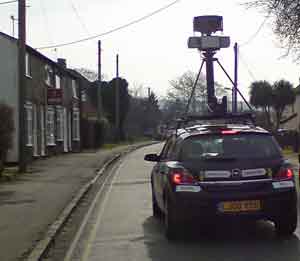Like most web users I’m an almost habitual user of Google search and I remember being one of its earliest adopters around 12 years ago when the likes of Yahoo and Alta Vista were the dominant search engines. I’m also quite an enthusiastic user of some of its derivative services, like Google News and Maps and I’m a tentative user of Google Scholar. However, I’ve thought for a while that its influence is far too dominant on the web to the extent that its famous motto ‘Don’t Be Evil’ is pretty meaningless — it’s almost irrelevant whether the people running this size of organisation are evil or not (and it would be very surprising if they were) as the fact of its very pervasiveness and power is inherently a ‘bad thing’.
I’m particularly suspicious of its plans to ‘digitise the world’s information’ because of its potentially disastrous effect on intellectual property rights — potentially creating much more widespread damage than Google News is currently wreaking on newspapers. Showing that these principles are generally as old as the hills it’s a classic case of killing the goose that laid the golden egg. It’s amazing how many people’s considered judgement is disregarded by puerile ‘my enemy’s enemy is my friend’ arguments because Murdoch’s News International is the biggest critic of Google in this area. If Google undermines intellectual property principles then it will be the viability of the small, niche publishers which vanishes first — not the Digger’s empire.
I also find Google’s arguments that it is a mere directory and conduit for other content to be completely disingenuous. It could make a lot more effort to remove links to illegal material — it’s just a cost that it doesn’t want to pay. After all, when it came to a question of making money or not in China it was happy to side with the censors then. Moreover, Google’s business strategy is primarily now devoted to loading content on to its site — either through user e-mails, videos or blogs or by uploading cheaply sourced material like scanning books (out of copyright ones for the time being). One of these sources of cheap content that I’m not convinced about is Google Street View so I was very interested to see the spy camera car in action today around Princes Risborough. It was happily cruising around taking six photos at once of everyone and everything on the road around it so I followed it for a while in my car with the objective of taking a picture of the spy vehicle itself.

When the driver realised I was following him he seemed to get quite agitated — quickly pulling over to let me past but I then stopped in front. After all what’s wrong with trying to take a photograph of someone who’s literally taking thousands of photographs with the sole intention of publishing them so everyone in the world can see them? I got a couple of photos but decided not to follow too long as I didn’t want every photo of Princes Risborough to also feature me. As far as Street View goes, I can see it may have some limited value in very public places like city and town centres but I can see no benefit whatsoever of it taking photographs of residential streets. They just do it because they can — and if an organisation has that sort of ethos then it’s on the slippery slope to becoming what some people may term ‘evil’.

Google should learn the lessons of other companies who have tried to dominate a platform — Microsoft has arguably inflicted more damage on itself with disasters like Vista which no doubt had root causes in the company becoming too big for mistakes to be spotted and rectified by competent managers — maybe managers whose time was being taken up fighting anti-trust suits. In desktop terms Microsoft really fulfilled what customers wanted with XP and late 90s/early 200os versions of Office. It’s a feature of global capital that it demands ever more growth but the pursuit of this is problematic when your company’s products have met about 95% of what any customer will ever need. Perhaps Google is in the same position now. It should stop expanding its empire — concentrate on what it does well — boring old search and leave the intrusive, customer-alienating expansion alone?
